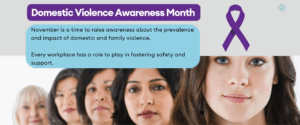
November DEI & HR Observances: Turning Awareness into Action
November is a month for reflection, learning, and meaningful action.
Across Canada, this month shines a light on issues at the intersection of equity, identity, and belonging from gender-based violence and trans inclusion to Indigenous disability and Métis leadership.
For HR professionals, people leaders, and organizations, these observances are more than calendar reminders. They’re opportunities to strengthen culture, policy, and practice building workplaces where everyone feels seen, valued, and supported.
Why These Observances Matter in the Workplace
Commemorating cultural and awareness dates helps organizations move from intention to impact.
79 % of employees expect their employer to take action on social issues that affect their communities. (Edelman Trust Barometer, 2023)
Companies with strong DEI cultures see 2.3× higher engagement and 27 % stronger performance. (Deloitte, 2020 Global Human Capital Trends Report)
Inclusive workplaces also experience higher retention and stronger employer brand reputation. (McKinsey, 2023 Diversity Matters Report)
Bringing awareness to commemorative and cultural dates is the first step. The next step is adjusting your policies, systems, and behaviours embedding inclusion, belonging, and equity into everyday operations. Together, these actions fuel engagement, retention, and innovation.
Key November Observances and How to Commemorate Them
Domestic Violence Awareness Month (All November)

What it is
Raises awareness about the prevalence and impact of domestic and family violence.
Why it matters
In 2022, nearly 80 % of police-reported intimate-partner violence victims in Canada were women and girls. (Statistics Canada, 2023 – Police-Reported Crime Statistics in Canada) Rates are higher for Indigenous, racialized, and 2SLGBTQIA+ individuals.
How to take action
- Review HR and leave policies for domestic-violence supports.
- Promote confidential resources and EAP services.
- Offer training for managers to recognize signs and respond safely.
- Share awareness campaigns (e.g., wear purple, host panel talks).
Transgender Awareness Month (All November)
What it is
A month to recognize and support transgender and gender-diverse people.
Why it matters
Transgender and gender-diverse Canadians experience significantly higher rates of harassment and exclusion, with 57 % reporting unwanted sexual behaviour in public spaces compared to 22 % of cisgender people. (Statistics Canada, 2020 – Survey on Safety in Public and Private Spaces)
How to take action
- Host training on gender inclusion, pronouns, and workplace transitions.
- Audit HR systems and benefits for gender inclusivity.
- Spotlight trans voices internally and externally.
- Encourage leaders to model inclusive language and allyship.
Indigenous Disability Awareness Month (All November)
What it is
A global observance created in Canada to highlight the experiences of Indigenous Peoples living with disabilities.
Why it matters
30 – 32 % of Indigenous Peoples report living with one or more disabilities — higher than the national average of 27 %. (Statistics Canada, 2017 Aboriginal Peoples Survey & 2022 Canadian Survey on Disability)
How to take action
- Partner with Indigenous-led disability organizations.
- Review accessibility policies through an Indigenous-informed lens.
- Create space for Indigenous employees with disabilities to share experiences.
- Embed intersectionality into your accessibility and inclusion strategies.
Métis Week (November 15 – 22)
What it is
A week celebrating Métis history, culture, and contributions across Canada.
Why it matters
Métis Week is an opportunity to recognize the rich culture, leadership, and resilience of the Métis Nation. One of the three distinct Indigenous Peoples in Canada, alongside First Nations and Inuit. Today, there are more than 587,000 Métis people across Canada (Statistics Canada, 2021 Census), many of whom continue to advance reconciliation, language revitalization, and self-governance. Understanding and acknowledging Métis contributions deepens our collective awareness of Canada’s history and supports ongoing efforts toward truth, reconciliation, and nation-to-nation relationships.
How to take action
- Invite a Métis guest speaker or share cultural teachings.
- Acknowledge Métis contributions in internal communications.
- Reflect on how Métis inclusion connects with your reconciliation commitments.
- Explore resources from the Métis Nation of Alberta.
Louis Riel Day (November 16)
Credit: Métis Nation of Ontario
What it is
Honours Métis leader Louis Riel and his legacy of advocacy, resistance, and nation-building.
Why it matters
Riel’s leadership remains central to Métis self-determination and Canadian history.
How to take action
- Host a learning session on Riel’s leadership and legacy.
- Recognize the day in staff communications or social media.
- Connect his advocacy for rights and equity to your inclusion goals.
Trans Awareness Week (November 13 – 19)
What it is
Trans Awareness Week is dedicated to increasing visibility, understanding, and allyship for transgender and gender-diverse people. It leads up to Trans Day of Remembrance (November 20) — a global day of mourning and reflection that honours trans and gender-diverse individuals whose lives were lost to anti-trans violence and discrimination.
Why it matters
Trans and gender-diverse people continue to face high rates of violence and exclusion. In Canada, 57% of trans people report experiencing unwanted sexual behaviour in public spaces, compared to 22% of cisgender people (Statistics Canada, 2020). Workplace inclusion remains critical — over 65% of trans and non-binary employees report feeling unsafe or uncomfortable being “out” at work (Egale Canada, 2023). Creating supportive systems and visible allyship helps build psychological safety and belonging for all employees.
How to take action
- Offer workshops or lunch-and-learns on gender inclusion, pronouns, and allyship, led by trans educators or advocacy groups.
- Encourage leadership messages affirming trans inclusion.
- Ensure your workplace has clear gender transition and anti-harassment policies that explicitly protect gender identity and expression.
- On November 20 (Trans Day of Remembrance), observe a moment of silence or share stories that honour those whose lives were lost to transphobia.
16 Days of Activism Against Gender-Based Violence (November 25 – December 10)

Photo Credit: UN Women
What it is
A global campaign to end gender-based violence (GBV) and promote equality and safety for all.
Why it matters
In 2022, women and girls accounted for 69 % of all victims of violence by an intimate partner in Canada. (Statistics Canada, 2023) Globally, 1 in 3 women experience physical or sexual violence in their lifetime. (World Health Organization, 2021)
How to take action
- Launch a “16 Days, 16 Actions” internal campaign.
- Review harassment and violence-prevention policies.
- Train leaders in trauma-informed and survivor-centred response.
- Share resources from Women and Gender Equality Canada.
Recommended Training Resource:
Leaders and HR teams can deepen their understanding by taking or offering the Engagement Strategies Toward Ending Workplace Sexual Harassment – AASAS Training course, developed by the Association of Alberta Sexual Assault Services (AASAS).
This evidence-based training explores practical strategies to prevent, recognize, and address workplace sexual harassment an essential next step in building safer, more equitable workplaces.
Moving Beyond Awareness: Avoiding Performative Recognition
Awareness is vital but impact requires follow-through.
To ensure observances are meaningful:
- Pair awareness with action — link each date to tangible policies, learning, or supports.
- Engage your people — involve ERGs, Indigenous partners, or employee stories.
- Reflect and measure — gather feedback and identify next steps after each observance.
- Connect the dots — align observances with your ongoing DEI and HR priorities.
Reflection Prompts for Leaders & HR Teams
As a leader or HR professional, taking time to pause and engage with these questions helps you assess not just what your organization celebrates, but how those efforts translate into equity, inclusion, and belonging every day.
Use these prompts in leadership meetings, team planning sessions, or post-observance debriefs. Encourage open, honest dialogue and capture takeaways that can inform future decisions, policy updates, and culture initiatives.
Which observances connect most meaningfully with our culture and workforce?
Identify where there’s alignment between your values and employee experiences. Focus energy where your efforts can have the most authentic impact.
How can we make our observance activities inclusive and intersectional?
Consider how overlapping identities (e.g., gender, race, disability, Indigeneity) influence people’s experiences. Ensure your initiatives reflect the diversity within your workplace, not a single narrative.
What changes to our systems or policies would reflect these values year-round?
Move beyond events. Look at HR practices, leadership behaviours, and decision-making processes that can be adjusted to reinforce inclusion long-term.
How will we know if our efforts made a lasting impact?
Define clear success measures: employee feedback, participation data, policy changes, or culture survey results. Evaluate regularly to keep momentum and accountability strong.
Tip: Assign one reflection prompt to each member of your HR, DEI or leadership team before your next planning meeting. Have everyone share one concrete idea or change that could carry the spirit of these observances into your everyday culture.
Download your free planning tool
Equip your HR and DEI teams with our “November DEI & HR Observance Planning Tool” — a two-page worksheet designed to help you record key dates, assign leads, plan actions, and embed meaningful follow-through. Download it now here and use it as the foundation of your November observance plan.
Further Reading & Resources
- Government of Canada Women and Gender Equality Canada – 16 Days of Activism Against Gender-based Violence
From Awareness to Action: How CEC Can Help
Building inclusive, high-performing workplaces means moving from awareness to accountability.
At Canadian Equality Consulting (CEC), we help organizations embed equity and belonging into every layer of their culture through modern inclusive HR design, DEI strategy, and transformative learning experiences.
Whether you’re reviewing policies, planning observance programming, or building long-term equity goals, we can help you design systems that make inclusion real.
Contact us to learn more: hello@canadianequality.ca
Stay Connected
Want to keep learning and stay inspired on your inclusion journey?
Connect with us for ongoing insights, resources, and practical strategies to build equitable, high-performing workplaces.
-
Follow us on LinkedIn and Instagram for weekly DEI tidbits, leadership reflections, and inclusive workplace tips.
-
Sign up for our newsletter for the latest DEI insights, planning tools, and upcoming learning opportunities.
-
Explore Equality 360 — our microlearning platform featuring interactive modules, toolkits, and resources built for HR leaders and teams.

